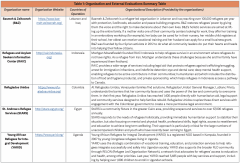In 2022, Resourcing Refugee Leadership Initiative (RRLI) commissioned an independent external evaluation of refugee-led organizations’ overall impact. You can read the metasynthesis of five external impact evaluations covering programs run by Refugee-Led Organizations (RLOs) in the report Understanding RLO Impact by Diana Essex-Lettieri, Independent Organizational Consultant and Researcher.
The earlier studies on RLOs have made numerous valuable contributions, including RLOs potential to bridge the gap left by international aid providers; they also reveal the inequities prevalent in humanitarianism, such as the inaccessibility of basic funding and participation. However, Essex-Lettieri states that the current body of research lacks the specific consideration of RLO impact, that is, the extent to which RLOs are succeeding at supporting their communities to address the many social, economic, and political consequences of being displaced. This report contributes to closing this knowledge gap by investigating the specific impact of five RLOs (Basmeh & Zeitooneh in Lebanon and Iraq, Refugiados Unidos in Colombia, Refugees and Asylum Seekers Information Center in Indonesia, Saint Andrew’s Refugee Services in Egypt, and Young African Refugees for Integral Development in Uganda), and to what extent their impact is indicative of RLO impact more generally.

This study tackles two key research questions: What impact trends can be observed across five externally evaluated refugee-led organizations (RLOs)? To what extent can observations be generalized across organizations or geographies? The findings of these questions show that the five RLOs are providing life-improving and life-saving services and solutions to thousands of people. The participation and leadership of community members in the RLOs who have encountered similar social, political and economic barriers as a result of forced displacement lead to an organic understanding of what services and approaches would be most useful and appreciated by their community members.
Essex-Lettieri concludes the study by presenting two questions for further research: “How might we support RLOs to access greater flexible funding and equitable partnerships with international institutions? And how might the international community reflect on how it ensures refugee responses are community embedded and driven by those with lived experience of forced displacement?”